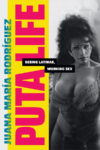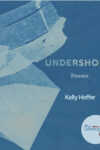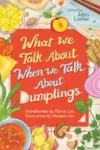
Image by Larissa Pham
When I lived in New York, my favorite pastime was to read erotic novels on the subway. I would buy them at used bookstores. Used erotica is the most extreme argument for why we still need books. How else can we be expected to form caring bonds with others if not through an archive of pleasure? Dog-ears, patches thumbed bare on spines, hairs and stains — these marks, common finds for those attentive to the damage and debris that accumulate on old books, are traces of what we feel when we read. Where we look, touch, pause, think, and leave. But in the case of used erotica, what we leave behind exposes a particularly vulnerable reading practice: our tender or brutal encounter with a universe imagined for sexual release. The erotic novel is a private but reproduced communiqué from a lover to a reader: it is the shape our desires take, and the medium for their resolution. I think I would have a hard time selling any of my used erotic novels, though I have no problem buying the remainders of others.
But I would read my erotic novels on the subway. I am ashamed to admit that I first discovered erotica through the New York Times Magazine — unless obscene literature like Madam Bovary, Lady Chatterley’s Lover, and Tropic of Cancer count, in which case I came to erotica through a basement bookshelf that held my parents’ college reading. Yet I had never lusted after erotica until I read a feature in the Mag on Nicholson Baker. At the time, I think it might have been 2010, Baker had a new erotic novel, House of Holes, and the article attempted to explain his double career as litterateur and eroticist. I had never heard of Baker, having been too deep in that basement bookshelf to surface and breathe in a little contemporary fiction, but felt an urge to read his non-erotic novels: Room Temperature, The Mezzanine, The Anthologist, etc. — before summoning the courage to buy Vox. Baker’s erotica stays in literary territory — Vox consists entirely of an extended phone sex session and explores, as it might be blurbed, the isolation and frustration that so dominated American life in the age before the internet — but it is still erotica. There is a lot of fucking in Vox, The Fermata, and House of Holes; those books are unashamedly about sex, even if they detour into less prurient matter. Despite their dirty insides, Baker’s erotic novels are plausible, presentable objects. They do not arouse much suspicion when carried in public, except among those nerds who enjoy really well written sex scenes that run on for hundreds of pages. And so the first erotic novel I ever read on the subway was Vox. It felt like sex in a parked car. In New York you never know, but I doubt my cover was blown.
The unique pleasure of reading erotica in public, and especially on the subway, is its low-grade naughtiness. Like climbing with ropes, exposure is limited. Risk is managed. While public sex demands a commitment to violating decency, the erotic novel can be thoroughly concealed. The reader can be the only person in the subway car who understands the ongoing transgression, however small. Public erotica is a weak but satisfying exercise in breaking rules. Sixteen Candles, not Straw Dogs. And on the subway, where reading is a strategy for ignoring others, reading an erotic novel is a parody of the nonchalant avoidance that structures urban life.
If you are reluctant to get hot on your commute, you can replicate the experience of public erotica by bringing your breakfast on the train. Public eating can be thrilling for the same reasons as public erotica: exposing the body in a private, biological moment to the scrutiny of strangers. (Public urination, particularly as it is necessitated during marathons and other road races, might be another interesting example of the thrill of exposure.) Suck down that burrito juice spilling off the foil wrap into your fingers and onto the subway seat; wrap your lips around a $2 farmer’s market apple and crunch; lick mayo residue from your turkey sandwich off your elbow. Belch, gulp, swallow, chew — tonsils, molars, and half-formed bolus open to view — impose the delicate perfume of your tupperwared leftovers on your seatmate. Or eat quietly, to yourself, and hope that others do and don’t see you spilling lamb and rice down your blouse. As another variety of limited exhibitionism, public eating interferes with the protocols we assume to protect our experience of the world from the intrusion of others in the same space. At the center of such propriety is an avowed fear and hatred of those people who are our fellow citizens, who live and eat and read and have sex so close to ourselves.
The same complex of fear and desire has contributed to the vogue for “open kitchens,” in which diners can watch the cooks at work as if through a one-way mirror, or the chef-as-waiter trend, or, in more advanced form, the “chef’s counter / table,” where the diner, for a price, can breathe heavily or salivate directly on the person who prepares and serves the food. Perhaps the only true fulfillment of public eating in a restaurant space, that is, a space designed to contain and neutralize the desire to eat-in-public, is the sushi bar. The hands of the sushi chef, their warmth and texture, are instantly communicated to the mouth of the diner. A piece of sushi, molded in three pats of the index and middle finger, tightened in turns around the palm, brushed with soy and virtually fed to the customer, contains the lingering impression of another body. The touch and heat of another are the very being of the meal. In that exchange, the possibility for public eating as a performance of care and solidarity is achieved.
I have only ever witnessed someone else reading erotica on the subway once. She was reading 50 Shades of Grey, thin blonde hair tucked behind an ear, and a trembling chin, small and rounded like a treble clef. Her cheeks drooped into the slightest jowls. I slouched against a pole and studied an ad for Dr. Zizmor, dermatologist extraordinaire, while watching her thin mouth dip into the paperback like a thirsty brown bird. And then I turned to her, to smile and acknowledge her minor but real attack on subway decency. Of course, Fifty Shades has been folded into mainstream culture—it is no longer, in any meaningful way, transgressive. Yet I sensed, from her serene enjoyment, that for her Fifty Shades meant more than a pop phenomenon. It may have offered a chance to escape the oppressive expectations of being in public.
Jason Bell’s work has recently appeared in Guernica, Vice, The Brooklyn Quarterly, and Alimentum. He writes a monthly column for Full Stop about food and culture and lives in New Haven, CT, and St. Louis, MO.
This post may contain affiliate links.







